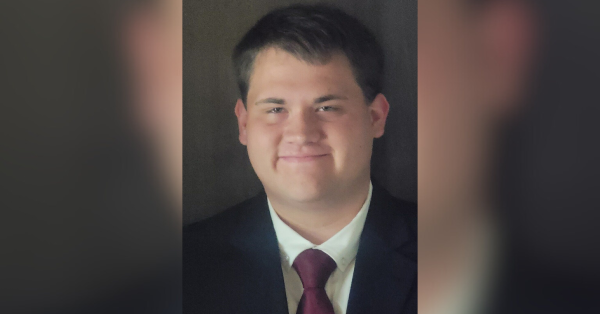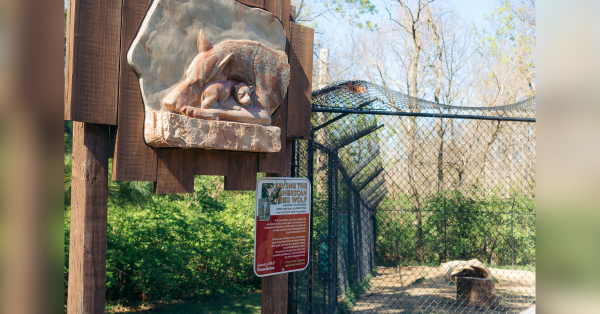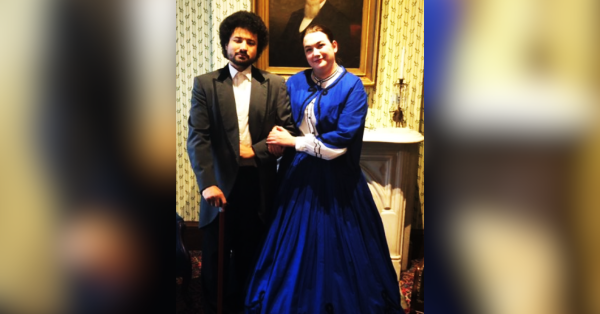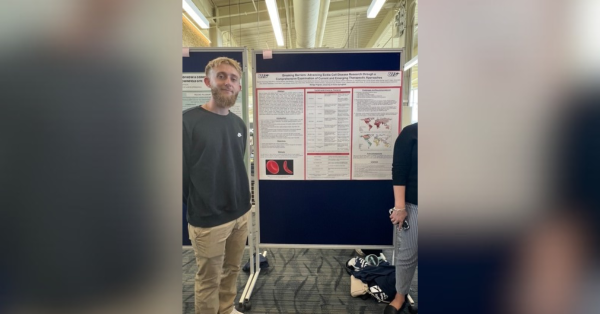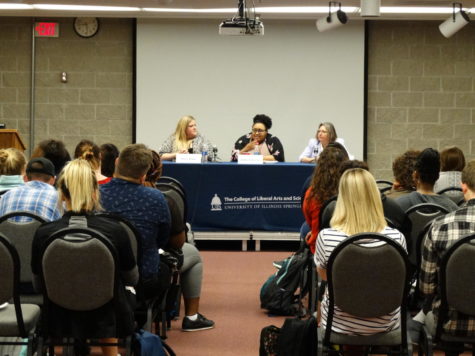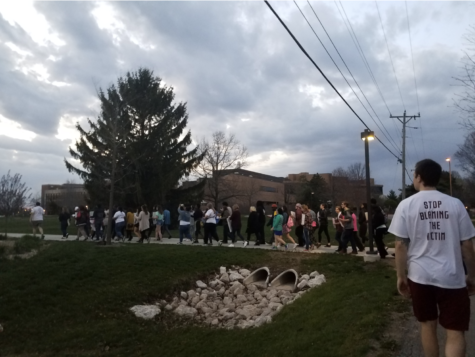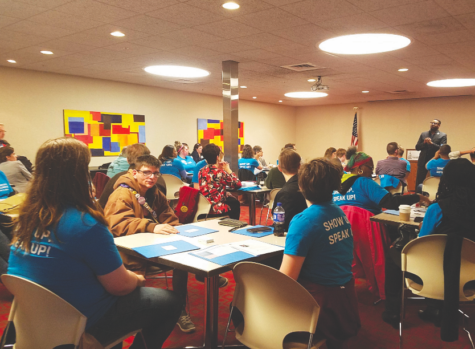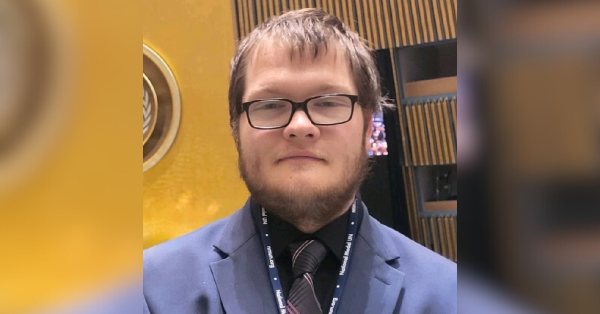A year in review
Revisiting the biggest stories of the 2016-2017 academic year
Crows Mill Pub

Aftermath of Crow’s Mill fire disaster
A local hang-out for of-age students, Crows Mill Pub was the place to go for Springfield nightlife. Students enjoyed the pub for its location (just a mile from campus), comfortable atmosphere, and lively company.
However, the pub met an unfortunate fate in late August, when an electrical fire burned out the interior.
While the structure of the building was still sound, the internal damage shut the bar down for the entire academic year. Other Springfield hangouts, including a bar on 6th Street and a few downtown nightclubs, tried to pick up the slack, but the absence of Crows was felt around campus.
Owner Scott Weitekamp always intended to reopen the pub after completing the necessary renovations, but students questioned whether it would be open in time for the Drunken Mile – an annual end-of-year celebration by UIS students at the pub.
Weitekamp told Journal reporter Jessey Bruce that he took the chance to renovate and increase the maximum capacity of the tavern.
Luckily, Crows will reopen on May 8, just in time for the May 11 event.
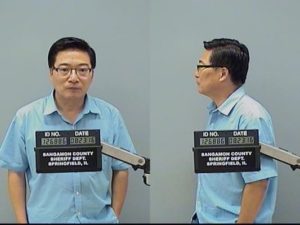
Xuesong “Gary” Yang
Early in the spring semester, news broke of sexual assault allegations brought against former UIS employee Xuesong “Gary” Yang. Yang worked as a visiting admissions counselor and student adviser, aiding international students as they live and study in the United States.
Complaints of sexual assault were brought against Yang in August 2016, right as his three-year employment with the university ended.
Because the alleged assault occurred at an off-campus location, the campus police were not required to inform campus community members of the incident.
Illinois Times (IT), a local weekly publication, broke the story in late January. IT published two stories about Yang, both of which detailed the victim’s story.
The university faced criticism for their response to the matter, as community members questioned the apparent silence that the school maintained for months after becoming aware of the complaint.
The university responded to these questions in a campus-wide email, saying, “A recent article in a local publication inaccurately portrayed how the University responded to an alleged off-campus sexual assault that took place last August.”
Deanie Brown, associate vice chancellor and UIS Title IX compliance coordinator, told The Journal, “I think what happened was that maybe a vacuum was created because of what we didn’t say.”
In the weeks following the news, Dr. Clarice Ford, vice chancellor of Student Affairs, hosted a campus panel on sexual assault. Students and community members spoke with campus leaders about official policies, safety tips, and what happens after reporting an assault or other crime.
Since January, Yang’s trial has been granted a continuance, meaning the jury trial won’t begin until May 15, 2017.
A no-contact order, which prohibits a defendant from having any contact with a victim, was granted to the victim in mid-February.
However, after both the victim and defendant failed to appear for a hearing in March regarding an order of protection – or a restraining order – the previous no-contact order was vacated.
Faculty Union
After nearly 20 months of negotiating with the UIS administration, UIS United Faculty, the faculty union of tenured and tenure-track faculty at UIS, called for a strike on May 1.
The call for strike came after the vote to approve a potential strike in mid-April.
The faculty are concerned with numerous aspects of their contracts, including personnel policy and pay.
Currently, personnel policy are not incorporated into contracts, making it difficult for faculty to air their grievances. Additionally, according to the union, the pay for UIS professors is less than the pay for other public university professors in Illinois.
As contract negotiations carried on, several professors began warning their students of a potential strike in the works.
On April 27, Ford sent out an email to students explaining the situation.
“Though we are doing everything possible to avoid a work stoppage,” the email said, “we also must be prepared and we want you to know how a possible strike could affect your classes, your grades, and – for those who are graduating this spring – the completion of your degrees. Please know that our priority is always to protect your educational interests.”
In a previous email, Chancellor Susan Koch said, “Strike activity will not interfere with our graduation planning or ceremonies.”
Flyers from the faculty union have been distributed in common areas around campus. The flyers act as an info sheet for students, answering some common questions.
“The administration continues to drag its feet on important issues like salary, faculty voice in the tenure process, and a meaningful grievance policy,” the sheet said, explaining the union’s motivation for a strike.
Currently, 160 professors are part of the union. Other faculty, including non-tenure-track faculty like clinical instructors and adjunct professors, are not part of the union and would not participate in a strike, should one happen.
In the event of a strike, Ford’s email encouraged students to attend their classes, regardless of whether their usual professor would be there.
“Regardless of any strike announcement, you should attend your scheduled classes. If you get to a class and your instructor is not present, please wait at least 15 minutes before leaving,” the email said.
More information can be found online from the UIS United Faculty Facebook page and from the Division of Student Affairs blog, blogs.uis.edu/studentaffairsnews/. In the event of a strike, The Journal will provide updates at uisobserver.com and on Facebook.
State Budget
Credit rating agencies Moody’s and Standard & Poor’s (S&P) downgraded several Illinois public universities in late April as the state approaches the end of its second fiscal year without a budget.
Northeastern Illinois University (NEIU), Southern Illinois University (SIU) and the University of Illinois (U of I) were all downgraded and put under a “negative” watch.
While S&P assigned U of I an ‘A-’ grade overall, the other universities were downgraded to “junk bond” status. The negative watch means that each school system, including U of I, can be reviewed again in 90 days.
The FY2017 ends on June 30, 2017. The current General Assembly session ends on May 31. In late March, Moody’s released a report warning Illinois policy makers of a bleak future if a budget doesn’t get passed.
“State leaders are at a critical juncture, facing a choice between further credit deterioration without a compromise or potential credit stabilization with a budget agreement,” the report said.
According to Moody’s, the agency examined several facets of each university before calling for a downgrade, including each university’s “exposure” to the state budget crisis and “each university’s own liquidity to bridge the funding shortfall.”
“By not fully paying its bills, Illinois is facing a growing risk of long-term damage to the state’s public higher education system and its network of human service providers,” the report said.
The report also said that if the budget crisis isn’t resolved soon, the state’s ability to fund its “prioritized payment streams,” like pension contributions, would be “subject to significant risk.”
In early April, Illinois House Democrats attempted to offer more than $815 million to public universities. Governor Bruce Rauner opposed the plan as another stopgap, calling for “real and lasting solutions.”
The Illinois Senate has been working on a “grand bargain” for months and was close to passing it in early March, only to have Senate Republicans pull their support at the last minute.
The grand bargain includes senate bills 1–13 and senate bill 16. The bargain was designed to appeal to both Democrats and Republicans in hopes of ending the stalemate between Rauner and the General Assembly.
Senate President John Cullerton (D-Chicago) told the Chicago Tribune that he hopes they can still pass the grand bargain, as they’ve already passed half of it. Because of how intertwined the bills are, the entirety of the bargain must be passed for the changes to take effect.
Rauner and House Speaker Michael Madigan (D-Chicago) met last Thursday to discuss the budget. Both parties ended the meeting with announcements of hope, though neither offered any specifics.



